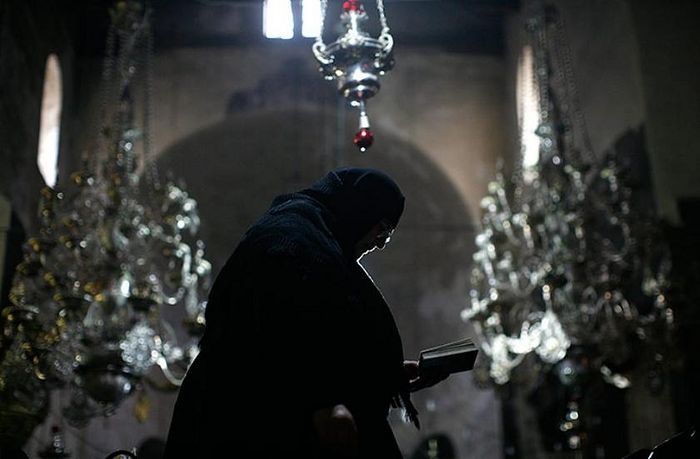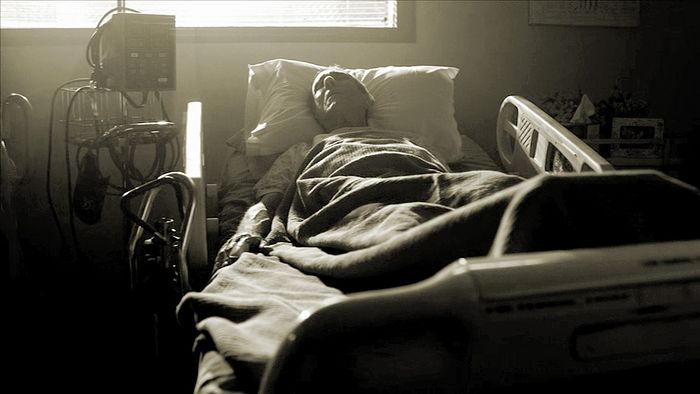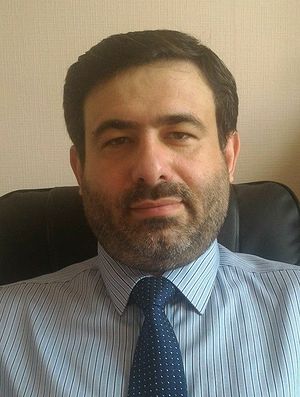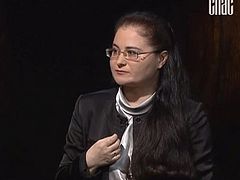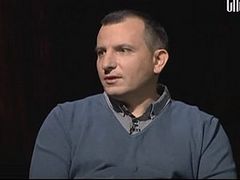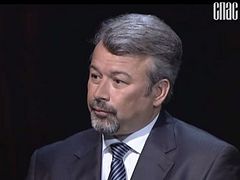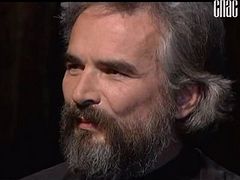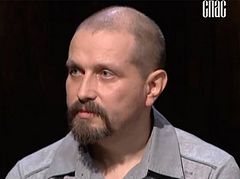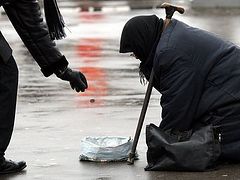Can a child inspired by reading the New Testament win an argument with his father, a scientist and a fervent atheist? Probably not, but he can stand his ground. Teymuraz Kristinashvili, a guest of Spas TV program My Path to God, will tell us about his journey to God and how a nun’s humble prayer overcame the resentment of a sick person. We will hear about the miracles and inexplicable events that happened with his family and learn how a businessman can enter the Heavenly Kingdom.
“After reading the New Testament I felt such a kinship with God!”
Priest George Maximov: Hello! You are watching My Path To God. The guest of today’s program is Orthodox businessman Teymuraz Alexandrovich Kristinashvili. Although in terms of culture and history the Georgian people are Orthodox, just like the Russian people, many people were torn away from their faith in the Soviet times. Was your family religious, and how did you begin your journey to God?
Teymuraz Kristinashvili: Thank you, Father George. Indeed, there were times when only Orthodox Georgians could call themselves Georgians, for if they were not Orthodox, they could not be Georgians. However, this was a long time ago and we were be born and brought up in Soviet times. My father was a very educated researcher. I should say that education does not always help people make good decisions and this critical approach and mistrust of everything that are sometimes associated with higher education were inherent to my father. The same could be said about my mother. She was a teacher. Everyone in our family had a scientific background and matters of faith were never discussed.
I went to a school with advanced physics and mathematics program, dedicating all my spare time to studies. I attended the main classes, elective courses, and some other classes. I learned about the Church and joined it in a simple and yet extraordinary way. Once my physics teacher secretly (remember it was in the 1980s) gave me a present—it was the book of the New Testament… I remember the moment very well when I became a believer. I was reading the New Testament… It was a Xeroxed copy, some words were barely legible and sometimes I read them wrong. I had a Synodal translation. When I finished reading the last chapter of the Apocalypse, I suddenly felt a feeling of such kinship with God! I remember that moment very well, because that was when I became a believer. I suddenly found something that I as a very young man was missing, and realized that living without it would be difficult.
By the way, we had a huge library at home. Believe it or not, we had about 20,000 books!
Father George: That is a very big library.
Teymuraz: My father would give me books from that library suited to my age and interests. Once, either without his knowledge or maybe with his help, I can’t remember now, I found a thin book called The Life of St. Sergius (of Radonezh). It was written in a very simple language, almost like a children’s book. It contained the main prayers, like O Heavenly King and the Lord's Prayer, as well as instructions on how you should behave and how to pray for your parents, sick people and friends. It was a very thin book. Being an avid reader, I could finish reading a fairly thick volume quite quickly, but every time I read this book, it made me see things from a different perspective, so I continued reading it throughout the year. When I finished reading it, it disappeared. At first I didn’t pay any attention to that, thinking that either my mother misplaced it or my father put it back into the bookshelf.
After a while, I started wondering, “Where is that book?” My brother, mother, father or close relatives who frequently visited us could not remember seeing that book at all. I described the book to them and kept saying, “How come you don’t remember it? I was reading it when you were in the room.” They still couldn’t remember. My father even absolutely denied that there were any religious books in our library…
That was my first encounter with faith and God.
Father George: Did you start going to church after that? Or did it happen later?
Teymuraz: I started actively searching. I felt assured that there was faith and that I needed to pray. So I started searching. I went to an Orthodox church, but did not understand anything. There was a certain language barrier, for just as Church Slavonic differs from Russian, Church Georgian is different from the modern Georgian. Even the letters are written differently. Therefore, I could not meaningfully communicate with the priest and conscientiously partake in the Sacraments. However, I attended the services and prayed as best as I could. I felt that I was doing the right thing in the right place. This gave meaning to my life.
That was when I felt the desire to be an active Christian. I felt like living not only for myself, but doing something out of my love for my neighbor and out of my love for God. This desire took such a strong root in my heart that I still have it. I pray to God that this desire never fades away. I think that people could be divided into those who like to work more and those who like to pray more. I did not reach that second state yet. I’m still on the stage when I want to work more for God and people. I may sound presumptuous, but this is what really brings me joy and gives me the feeling of happiness that people can experience on this Earth.
“Her prayers humbled my father.”
Father George: How did your parents take your choice when they understood that you became a believer? You weren’t concealing your spiritual quest…
Teymuraz: No, I wasn’t concealing anything. It was very difficult for my parents to accept it. You can say that for my father and mother this was a disaster. Their child who showed so much promise suddenly stepped on a path that seemed so strange to them… My father stopped eating at the same table with me.
Even though I was a child, I easily countered the scientific arguments of my father. I felt that it was my heart speaking, inspired by God.
However, when my parents realized that this was not a temporary emotional impulse and that I was not going to turn back, my father bought the Bible and started studying it diligently, saying that it was full of contradictions, distortion of historical events, and fictitious stories. He devoted a fairly long time to such critical studies. Even though I was a child who was relatively uneducated, I easily countered all his scientific arguments. I actually felt that the answers were not coming from my own mind and understood that it would be difficult for me to repeat these answers. I felt that somehow it was my heart talking, inspired by God. It was such an intense feeling… My father was a very educated man and nobody could ever beat him in an argument. Nevertheless, the words I said nonplussed him. He would silently admit that my argument was valid and retreat to his study to look for more contradictions and historical inconsistences in the Bible.
With time, things settled down and my father turned to God. The circumstances of his conversion were amazing. My grandparents converted too. Practically my entire family came to the same conclusions as I did, only years later.
Father George: Did it happen through your efforts?
Teymuraz: I don’t think so.
Father George: The story about your father has particularly sparked my interest. How did he come from such a fervent atheistic negation of Christianity to the faith that he was previously fighting in his family?
Teymuraz: It has to do with such an important concept as the meaning of suffering. Why do we have sorrows, illnesses and troubles? My father’s example showed to me that even the most severe crises and tribulations happen for people’s good. I will tell you a story about my father’s path to religious life. My mother was younger and our faith-related quarrels had been for over quite a long time, and we reached common ground… She did not deny faith, and although she wasn’t a deeply religious person, she started going to church too. Unexpectedly she passed away. It happened so suddenly. She just passed away in her sleep. My father, a very domineering person both in terms of his character and in terms of his status (he held a certain government position) took this loss very hard. So hard that he lost any interest in life. He didn’t want to live. Soon afterwards, he had a stroke.
Father George: Was he paralyzed?
Teymuraz: Yes. Severely. He practically couldn’t move, couldn’t even sit properly, couldn’t eat without help or go to the bathroom. Basically, he couldn’t do anything. He could speak a little, but his speech was distorted, and you had to love him in order to understand what he was saying. At that time, Georgia was going through difficult times. Civil war led to much devastation. I was living in Moscow, hoping to carve out my life here, while my brother stayed in Georgia. Later he decided to find work abroad as his financial situation was very difficult. Since he had to go to England for a long period of time, we had to find somebody to stay with our father. I was already settled here, and transporting my father from Tbilisi to Moscow was not only complicated also but risky for his health. Besides, my father was so against living in his current condition that he became not just a grouchy and sick old man, but a really mean person. He was angry that he was still alive and vented his anger at anybody who would approach him. My brother made a dozen attempts to hire a caregiver or a nurse to look after my father. But my father would start fussing, swearing and verbally abusing them. Quite obscenely. Anyway, no nurse could ever tolerate being more than two hours near him.
In a state of almost total desperation, my relatives remembered that one of their close friends had become a nun in a convent in Georgia. They came to her and asked if the church could help them in anyway. The abbess of that convent had a novice, who was an older woman, but very lively and strong. She wasn’t very well educated. With no higher education, she was no match for my father. Anyway, she started looking after him. She would give him his medicine and food, do all the necessary procedures and start reading her prayers. She would pray vocally and at the top of her voice for about two hours. He was swearing profanely, but she paid no attention to him and continued sitting by his side and praying. He had been swearing at her for a week, two weeks, a month… Then he just got too weak and had to listen to her prayers. She didn’t see him as a figure of any authority. Once she asked him, “Do you know the Lord’s Prayer?” He said that he didn’t. And she said, “Phooey! What kind of a professor are you, if you don’t know the Lord’s Prayer?” For her, a professor who didn’t know the Lord’s Prayer was a waste of space.
My father started listening to the words of the prayers… Soon he couldn’t wait for his nurse to start praying.
She kept on praying and my father started listening to the words of the prayers. After a while, these words somehow got to him. Possibly, he felt the same thing that I felt reading the New Testament. He started listening to them with joy… He no longer waited to be fed; instead he waited for her to start praying.
When my brother came back to Georgia, we didn’t need the help of that woman anymore and she returned to the convent. My father asked for a large print prayer book and started reading it himself. He turned the pages with one finger, even though it took him a lot of effort.
I was so happy when he called me and said, “Son, I can’t take care of you now, but I will be praying to God, asking Him to take care of you.” I realized that my father had accepted God and that now he relied on God more than he ever did in his life. It would be difficult to imagine him saying this if he still had good health and held his important position. At that time, nobody could have swayed him from his path.
Father George: Indeed, sorrows can lead people to God, transform them, make them wiser and empathic… This, of course, depends on the inner choice that the suffering person makes. Sometimes sorrows only embitter prideful people and some of them unfortunately stay until the very end in the same state of mind that your father had. Thank God that he turned his sorrows to his spiritual benefit.
Miraculous Baptism
Teymuraz: I would like to say that after accepting God my father asked my brother to arrange for his baptism. My brother just came back to Georgia and was busy taking care of his affairs. So he said, “Father, you lived without baptism for so many years, wait a bit more… I will get you baptized in a week or so.” And he kept postponing the baptism. Then sorrow struck again and my father had another stroke. When he was brought to the hospital, the doctors said that he had only few hours to live and that there was no hope. My brother felt very sorry that he never found the time to baptize our father even though he kept on asking him to do it. So, my brother called his friend Irakly who was an assistant deacon of Elijah, the Patriarch of Georgia, and asked him to find the priest as soon as possible. It was late evening, almost nighttime. Irakly promised to help right away, but due to strange turn of events, when he tried to call the priests he knew, they either couldn’t be reached or were out of the city and by the time they could come, it would have been too late… Time was running out.
Then Irakly started just going to churches in Tbilisi and asking for a priest. Many churches in our city stay open through the night, but no priest could be found this late. Desperate, he called my brother and offered, “I’ll just come to the hospital and we will baptize your father ourselves, without a priest…’ Then he noticed that he was driving by another church and said, “Wait, I’ll just check this last church and if there’s no priest, I’ll come to the hospital.” According to Irakly, he walked into the church and saw a priest wearing a white cassock who was… It is inappropriate, but I should tell it the way it was—the priest was sitting on a bench in the narthex and drinking beer. Next to him was a little suitcase with all the baptismal accessories ready! Irakly was very happy to see the priest and rushed to him, “We need you urgently! We need to baptize a dying man.” The priest said, “Yes, of course.” He put the bottle under the bench, took his suitcase and got up… They came just in time to baptize my father.
My father came to, and looked at everybody with lucid eyes. He was very happy that he was baptized. He couldn’t speak, but he said goodbye with his eyes.
When the priest completed the Sacrament of Baptism, Irakly offered to find a car to take him home. My father passed away as the priest was leaving.
When my father passed away, everybody who was in the room had no feeling of sorrow or tragedy as when my mother died; they felt something different. His passing left everybody feeling tranquil and peaceful.
“No”, they said in that church. “We don’t have a priest like that and never had anybody like him!” So who was he and where did he come from?
Here’s what happened afterwards. The next day we tried to find that priest and came to that church. Irakly, as an assistant deacon of the Patriarch, felt he had a certain authority in the church. He said to the people in that church, “Last night, I met a priest here who went to the hospital with me,” and described that priest. They told him that they never had anybody like that. He called for the senior priest and explained everything to him. The senior priest also told him, “We never had a priest like that.” They called for a night watchman. He came and also said that there was no priest like that in the church. Irakly started shouting at him, “You must have been drunk. Don’t you remember that I came here last night?” The night watchman, an elderly man, said, “Why are you being so rude to me? I remember everything very well. You came here, walked into the church, stayed there for five minutes and walked away alone.” The night watchman insisted that that was what happened.
Irakly, still unsatisfied, went to his godfather who was a bishop and asked him to help us find this priest. They announced some kind of a search for the priest, but no priest like that could be found in Tbilisi or in the surrounding area.
I have to tell you something here. About a week before my father’s death, Irakly came to see my brother, but he wasn’t home. My father asked him to stay and started talking to him. He told Irakly about his whole life from the beginning to the end. Irakly was too polite to interrupt him, even though he was in a hurry, so he postponed all his affairs and listened to my father’s story. After my father’s funeral, the memories from my father’s life started bothering Irakly. He came to his spiritual father and told him about his problem. I don’t remember all the details now, but the main answer was that my father, being a non-religious man and not knowing about confession, basically confessed to Irakly, and since Irakly wasn’t a priest, he could not carry the burden of this confession. The bishop promised to pray for him and said that Irakly should read certain prayers for a certain period of time. After that period passed, the memories and concerns that bothered Irakly faded away. However, the question remained: Who was the priest that baptized my father? Again, Irakly came with this question to his spiritual father and said, “Where could he have gone? I even shook his hand when we said goodbye!” The bishop, his spiritual father, said, “You know what, Irakly, I think that he was an Angel of God.” “But he was drinking beer!” objected Irakly. The bishop replied, “He probably made you think you saw that so that you wouldn’t see that he in fact was an angel. But this just my assumption.” So, we left it at that and accepted the bishop’s explanation.
Father George: Indeed, there are known cases, although quite rare, when an Angel would come to baptize a dying man when there were no other options for baptism. Why is it so important to die a baptized man? Because Our Lord Jesus Christ said, “Except a man be born of water and of the Spirit (i.e. unless a man is baptized), he cannot enter into the kingdom of God.” (John 3:5). So, baptism essentially determines what happens to a person after death.
It was God’s mercy that your father had an opportunity to be baptized before death. That doesn’t happen to everyone. So, those wishing to be baptized shouldn’t put it off.
Teymuraz: My father possibly somehow pleased God and for the sake of the sorrows he experienced God made such an extraordinary baptism possible for him. However, with my background as a physicist, I am quite sceptic about miracles. This is the result of my upbringing. As such, I can’t say that I am 100% sure that this was what actually happened. But I couldn’t help but tell you this story.
There were many things that I wanted to find out for myself. Once we came to visit our ancestors’ graves. We have a family cemetery where all our relatives are buried. I always felt depressed at the cemetery. It is customary in Georgia to put photographs of the deceased on the gravestones. When you look at these photographs, you don’t feel any tranquil or positive feelings, because many of these people passed away too young, some died tragically and some of them you simply miss. I always felt dismal there.
So I came to my father’s grave, as we wanted to have a Pannikhida (memorial service for the dead). When I approached the grave, I felt good at the cemetery for the first time. I felt peace, tranquility and happiness. As a physicist, I decided to experiment. I came up to my grandfather’s grave and the feeling of happiness was gone. When I returned to my father’s grave, I felt that my soul was at peace again. Then I approached the graves of my uncle, mother and grandmother and felt depressed. When I came back to my father’s grave, I felt peaceful and happy again. When the priest was serving the Pannikhida, I for the first time felt some kind of elation, so to say. This experiment convinced me that the bishop’s explanation about an angel baptizing my father was probably true. Maybe my father went to heaven without any particular virtues or great deeds, but he went baptized… “I confess one Baptism for the remission of sins.” I hope he is at peace now…
Father George: I would like to touch upon the subject of your business. Can business activities be in harmony with the sincere belief in God and life according to faith, or do they conflict them? What was your experience in this respect?
Teymuraz: The first thing that comes to mind when people think about a businessperson is the Lord’s words, It is easier for a camel to go through the eye of a needle, than for a rich man to enter into the kingdom of God (Matthew 19:24). So many people believe—it is a kind of a stereotype—that these words mean that the Heavenly Kingdom is closed for businesspersons or entrepreneurs. However, God never specified who He was speaking about. He said “rich man”, but this does not necessarily mean a businessman or entrepreneur. People from various walks of life could be rich.
I should say that according to various estimates, approximately 94 percent of all entrepreneurs fail in their initiatives. In other words, a great majority of those who chose this line of business would either go bankrupt or discontinue their business. Only 6 percent “stay afloat”. I don’t know any teachers, military men or tradesmen who went broke. It can happen, but not in such great numbers. Bankrupt businessmen, however, are quite common.
Another stereotype is that a businessperson is always rich, because everybody knows those 6 percent who managed to stay afloat. However, this is not always so.
As far as entrepreneurship is concerned… Apostle Paul also wove baskets and you can in way call him a small-scale entrepreneur. He was earning his living by working and selling the products of his labour.
Father George: But still there is a difference.
Teymuraz: Absolutely. Here we approach a key moment. If Apostle Paul hired some workers, expanded his product line, opened a network of basket-making shops, and lobbied his interests in the Senate, he would be a successful businessman, but is it unlikely that he would become an apostle.
Father George: He was making his living rather than living for this business.
Teymuraz: Exactly! He was not living for this business. That was what I was going to say. A scientist could be obsessed with the wish to succeed. A man of any trade can be obsessed with his trade and live for it. In this case, it doesn’t matter whether you are a businessman or a tradesman, as you are obsessed anyway. Such obsession pushes love for God, people, family and friends out of your heart. The more you are obsessed with various ideas, the farther you distance from God. This is applicable to entrepreneurs as well. If an entrepreneur lives only for his or her success, and the entrepreneurial success is always measured by certain capitalization—or putting it simply, by the size of his bank account… So, if an entrepreneur begins to think about success only, then it would be difficult for such a person to enter the Heavenly Kingdom—just as it is for any other people who are obsessed about their professions, success, vanity, etc.
Firstly, God specifically said, He that loveth son or daughter more than me is not worthy of me. (Matthew 10:37). That is why the hierarchy of values in your heart is very important: God comes first and then come your love for your neighbours, family and friends. The love for your work comes after that. Here I don’t see any difference between an entrepreneur and, for example, a teacher. A businessperson’s wish to be rich can be as obsessive as a teacher’s wish to be the best teacher, recognized by everybody.
Secondly, entrepreneurship gives you a certain freedom. You can create things that make this life better. You can make good food products or quality clothes; you can provide some useful and needed services. Or you can just do a sloppy job. Using your talents, you can somehow make the world better or worse. This is where the entrepreneurs must choose their path. Will they be honest and make products that people would be grateful for, or to the contrary would they create things that will only make people curse.
Thirdly, I believe entrepreneurship has an advantage, because entrepreneurs are mostly quite non-standard people who think outside the box; they are the people who went through a school of hard knocks and know how to communicate with others. Apostle Paul said, “Bear ye one another's burdens” (Galatians 6:2). Very often entrepreneurs have more opportunities to follow this commandment by helping less talented or a less fortunate people. People of other occupations won’t have as many opportunities to do this. That is why, if you want your work to change the world and make it better, entrepreneurship would give you a wider range of opportunities.
Father George: My God grant that all entrepreneurs would choose the better path. Thank you for your story.

